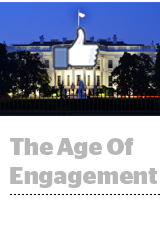 Republican presidential hopeful Dr. Ben Carson has been surging in the polls, by a strict reading the only current rival to Donald Trump.
Republican presidential hopeful Dr. Ben Carson has been surging in the polls, by a strict reading the only current rival to Donald Trump.
Carson has approached the election from a fundamentally different perspective, said Ken Dawson, president of Eleventy Marketing Group, which received more than $400,000 from the Carson campaign for “web services” in the past quarter, according to federal filings.
“For one thing, how we approach Ben Carson as a brand is different from other candidates,” Dawson said. “We also do more to cultivate a feeling of transparency and two-way dialogue.”
While part of that comes from Carson’s soft-spoken demeanor, which contrasts with other candidates, Dawson also credits digital channels, notably the campaign’s massive investments in Facebook.
Dawson said he suspects the campaign “is spending more, many times more, on Facebook than anyone ever has in terms of politics.”
Facebook declined to confirm, though its client partner for Republican and right-leaning accounts, Annie Lewis, told AdExchanger that Carson’s campaign uses “the entire suite of tools Facebook provides.”
Carson’s team did not respond to request for comment.
“How we used Facebook originally was the need for straightforward awareness,” said Dawson. Up against Trump and more than a dozen governors, senators and House representatives, Carson faced a severe name-recognition gap.
Carson’s Facebook presence, Dawson said, became the top of a lead-gen funnel. It’s an approach more reminiscent of brand marketing than most modern campaigns: “We have Facebook as the top of the sales funnel … and we quickly move to convert them into donors or supporters.”
This might account for Carson’s unusual – yet successful – fundraising. In the third quarter, for instance, he raised $20.8 million, the best of any Republican – 98% of which came from contributions of $200 or less.
To supplement its lead-gen strategy, the Carson campaign has built a pair of apps. The first, called Ask Ben, is “a proprietary internal system that ingests all the communication touchpoints, aggregates them and allows us to respond,” said Dawson.
The campaign also launched a new app on Thursday with the help of TopFan, an app-development platform that works with celebrities and media brands – this is its first political account.
TopFan founder and CEO Jeff Kohn said the native app is meant to “to create a medium for information delivery and engagement that resonates with millennials and college-age voters.” It also enables the building of audience profiles to deliver targeted, issue-specific content.
The embrace of new digital engagement tactics from the Carson campaign has not gone unnoticed by outside GOP strategists.
“What they do every night with their ‘Ask Dr. Carson’ initiative is incredibly impressive,” said Zac Moffatt, Mitt Romney’s digital director in 2012 and the founder and CEO of GOP tech firm Targeted Victory.
The Carson campaign “has been very successful at generating opt-ins and conversions from potential supporters (via Facebook),” added Peter Pasi, a GOP media consultant and VP at Collective. “They’ve done an enviable job other campaigns should learn from.”
Carson’s raw Facebook engagement metrics (users who either comment, like or share campaign content) outperform his more recognizable rivals. More than 6 million individuals have engaged with the Carson campaign this month, resulting in 25 million communication data points.
About 2.1 million users have interacted just less than 10 million times with the campaign of Sen. Ted Cruz (R-Texas) in the same period, and Sen. Marco Rubio (R-Fla.) has had 1.2 million users and 3.2 million engagements.
Trump roughly doubles Carson on both Facebook metrics – though that ratio is skewed much more in Trump’s favor for the share of attention he receives on media channels like Twitter, print and cable TV.
Dawson said that as the campaign moves from early list building and fundraising into persuasion, with more emphasis on video and TV, resources will shift accordingly. “But Facebook will continue to be the central communication hub and a key paid media target,” he said. “That’s how people are coming into the fold.”













